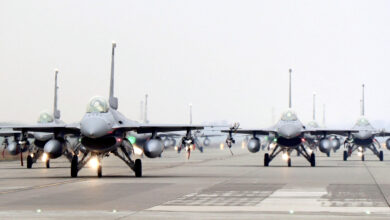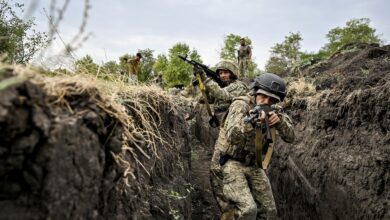
More than two years since Russia’s full-scale invasion of Ukraine, the conflict has quickly become a global touchstone for asymmetric warfare — an ideological struggle between democracy and autocracy, light and darkness.
After much delay, US policymakers have opted to send additional military resources to Kyiv, culminating in a $61 billion aid package last month. While assistance has already paid dividends on the battlefield, ongoing Chinese and Iranian assistance continues to fuel Vladimir Putin’s aggression.
Concurrently, Israeli officials have also lamented about not receiving US munitions fast enough in their pursuits to dismantle Hamas.
Industrial Innovation
While Washington cannot be “all things in all places” to our allies, we can pursue a coherent, multi-regional policy that extends technological- and defense-based industrial innovation to trusted partners in key regions.
Employing such an approach solidifies bipartisan Congressional support — an increasingly rare proposition — between spending skeptics and proponents of US global leadership.
More importantly, carefully extending key weapons and technology systems to select allies will bolster Washington’s collective defense posture and, in turn, stymie growing territorial appetites by strongmen in the Middle East, Europe, and Indo-Pacific.
To the Administration and Congress’ credit, they have made preliminary but meaningful strides in removing regulatory barriers to augment allied collective defense.

Collective Defense
Enhanced coordination through AUKUS, a trilateral security partnership between Australia, the UK, and the US, includes easing defense technology export restrictions and transferring select US nuclear submarines.
In today’s increasingly tech-driven defense landscape, carefully sharing and coordinating industrial innovations with allies is key to the future of US collective defense.
While the European Union has taken a leading role in coordinating continental defense preparedness, Washington can, and should, extend limited defense innovation know-how to select NATO players in Putin’s backyard.
Of course, not all critical technologies, assets, and ammunition should be treated equally. While the risks and costs of unauthorized weapons access or disclosure must be weighed, insufficient deterrence capabilities and their harmful impact on Washington’s broader global influence must be given similar weight.
National Security Vetting
Against this backdrop, a federal security review is now proceeding through the Committee on Foreign Investment in the United States (CFIUS), the regulatory authority charged with vetting all major foreign purchases of domestic companies.
The proposed purchase of US ammunition manufacturer Visa Outdoors’ Kinetic Group company by Czech company CSG – a major supplier to the Ukraine war effort – is making headlines. Skeptics have raised national security concerns about alleged ties to foreign adversaries.
Yet, the Czechs, and many companies within its territory, have been on the frontlines, providing money, equipment, weaponry, and cyber support in defense of Kyiv’s territorial sovereignty.
While CFIUS reviews every transaction uniquely, CSG’s 2022 purchase of US ammunition manufacturer Fiocchi Ammunition (with facilities in Arkansas and Missouri) is encouraging.
While by no means perfect, CFIUS reviews are detailed, rigorous, and evolving to meet the constantly changing global security landscape. Other national security vetting instruments are also coming to the fore, including growing federal oversight of commercial transactions and their adverse impacts on US persons’ data security.
If run through the gauntlet of US foreign investment scrutiny and approved, particularly in this highly charged political environment, it will signal an important precedent and evolution in Washington’s commitment to shared defense innovation.

Responsibly Exporting Innovation
In today’s unprecedented global threat environment, we do not have to choose between our economic well-being and national security.
Responsibly exporting defense and technological innovation to key partners will serve as geopolitical force multiplier, reinforcing our commitment and obligations to critical allies, positively stimulating jobs, and preserving US global leadership and the core values those values represent.
 Adam Stahl is a national security professional with stints at the Senate Commerce and Foreign Relations Committees and the Department of Homeland Security.
Adam Stahl is a national security professional with stints at the Senate Commerce and Foreign Relations Committees and the Department of Homeland Security.
A former deputy chief of staff in the Department of Homeland Security Office of Strategy, Policy and Plans, he led the development of the department’s China and Arctic strategies.
He now works for an energy company.
The views and opinions expressed here are those of the author and do not necessarily reflect the editorial position of The Defense Post.
The Defense Post aims to publish a wide range of high-quality opinion and analysis from a diverse array of people – do you want to send us yours? Click here to submit an op-ed.











